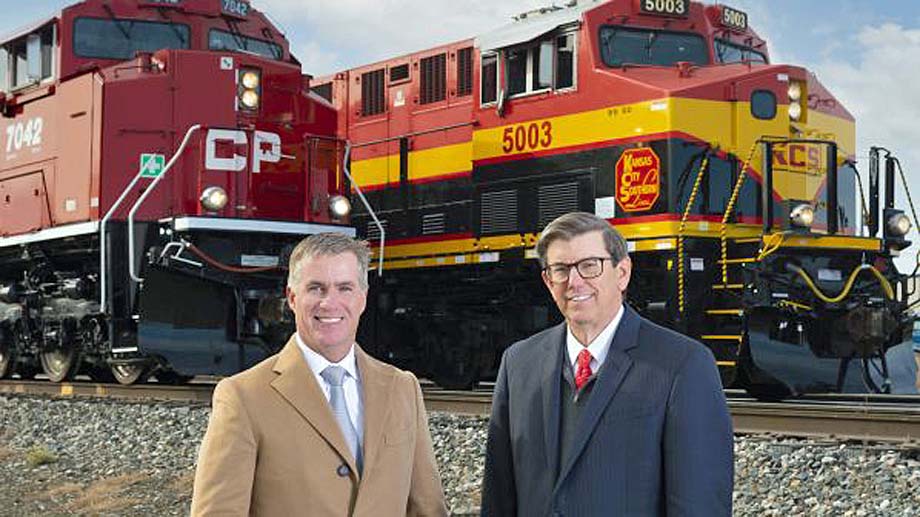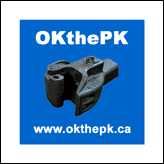
Calgary Alberta - Canadian Pacific (CP) and Kansas City Southern (KC;) said today the U.S. Surface
Transportation Board (STB) issued a decision approving the CP and KCS joint merger application, subject to certain
conditions, thereby authorizing the two railways to combine to form Canadian Pacific Kansas City (CPKC), the first
single-line railway connecting the U.S., Mexico, and Canada.
The decision authorizes CP to exercise control of KCS as early as 14 Apr 2023 at or after which point CP and KCS would
combine to create the new CPKC.
CP is reviewing the full 212 page decision in detail and in the coming days will announce its plans with respect to the
creation of CPKC.
CP President and Chief Executive Officer Keith Creel extended the company's sincere gratitude to the STB board and
staff for their hard work as part of the comprehensive review of the combination.
"This decision clearly recognizes the many benefits of this historic combination. As the STB found, it will
stimulate new competition, create jobs, lead to new investment in our rail network, and drive economic growth,"
Creel said.
"These benefits are unparalleled for our employees, rail customers, communities, and the North American economy at
a time when the supply chains of these three great nations have never needed it more. A combined CPKC will connect
North America through a unique rail network able to enhance competition, provide improved reliable rail service, take
trucks off public roads, and improve rail safety by expanding CP's industry-leading safety practices," Creel
added.
"This important milestone is the catalyst for realizing the benefits of a North American railroad for all of our
stakeholders. The KCS Board of Directors and management team are very proud of the many contributions and achievements
of the people who have made KCS what it is today and we are excited for the boundless possibilities as we move forward
into the next chapter as CPKC," said Patrick J. Ottensmeyer, KCS President and Chief Executive
Officer.
CPKC will bring a new standard of safety to the North American rail landscape.
CP has been the safest railroad in North America for 17 straight years as measured by the Federal Railroad
Administration train accident frequency ratio.
In 2022, CP had an all-time best frequency of 0.93, a rate nearly half what the company produced a decade ago and 69
percent lower than the Class 1 average.
CP's culture of safety, supported by its history of sustained investments in core infrastructure and technology, aligns
with KCS's likeminded culture, allowing the combined system to operate at the apex of rail safety.
CPKC will implement the combination with safety at the forefront of everything it does.
Among the core conclusions reached by the STB regarding the public and pro-competitive benefits of the CPKC
combination, including that the combination "should ultimately enhance safety and benefit the
environment":
"The Board expects that this new single-line service will foster the growth of rail traffic, shifting
approximately 64,000 truckloads annually from North America's roads to rail, and will support investment in
infrastructure, service quality, and safety," the board said in its decision, going on to say, "Indeed,
approval of this transaction may even enhance safety for the nation as a whole" and that "thus, any rail
traffic diverted to CPKC from other railroads will likely mean traffic moving to a railroad with a better safety
record."
"The transaction is also expected to drive employment growth across the CPKC system, adding over 800 new
union-represented operating positions in the United States. Of additional importance, the merger will foster new
National Railroad Passenger Corporation (Amtrak) passenger rail opportunities, as Applicants have committed to support
Amtrak's existing plans for expanded service on the new railroad's lines. This transaction is "end-to-end,"
meaning that there are little to no track redundancies or overlapping routes. If consummated, it will reduce travel
time for traffic moving over the single line service, it should result in increased incentives for investment, and it
will eliminate the need for the two now-separate CP and KCS systems to interchange traffic moving from one system to
the other. This will enhance efficiency, which in turn will enable the new CPKC system to better compete for traffic
with the other larger Class I carriers," the decision says.
The board concluded, "The Transaction will make possible improved single-line service for many shippers and will
result in merger synergies that are likely to allow CPKC to be a vigorous competitor to other Class Is by providing
improved service at lower cost."
CP completed its US$31 billion acquisition of KCS on 14 Dec 2021.
Immediately upon the closing of that acquisition, shares of KCS were placed into a voting trust with Dave Starling,
former KCS President and CEO, appointed as the trustee.
Upon Mr. Starling's death, Ronald L. Batory was appointed as successor trustee with the STB's approval.
The Voting Trust has ensured that KCS operates independently of CP during the regulatory review process, and until CP
exercises control pursuant to the STB decision, CP and KCS will continue to operate independently.
Headquartered in Calgary, CPKC would be the first railway connecting North America.
While remaining the smallest of six U.S. Class 1 railroads by revenue, the combined company will have a much larger and
more competitive network, operating approximately 20,000 miles of rail, employing close to 20,000 people.
Once combined, full integration of CP and KCS is expected to happen over the next three years, unlocking the benefits
of the combination.
Author unknown.
(likely no image with original article)
(usually because it's been seen before)
provisions in Section 29 of the
Canadian Copyright Modernization Act.


